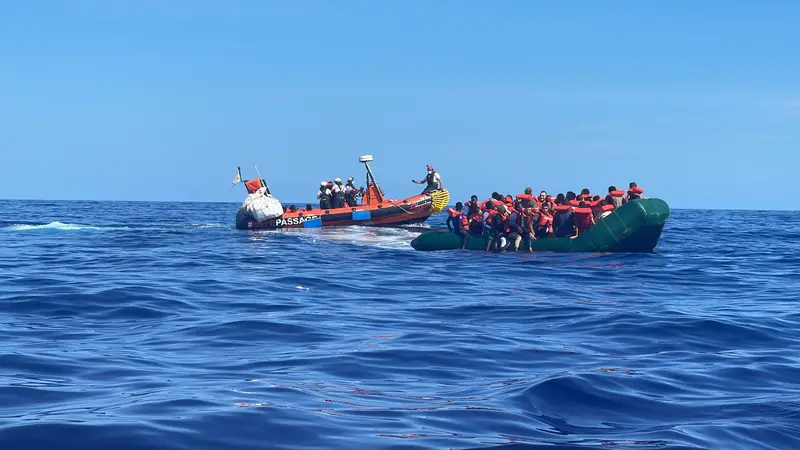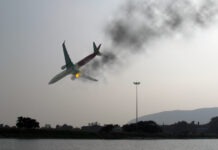At least 42 people are missing and presumed dead after a boat carrying migrants capsized off the coast of Libya, the United Nations’ migration agency confirmed on Wednesday, November 12, 2025. The International Organization for Migration reported that seven male survivors were located after the vessel’s engine failed in high waves around dawn on November 3, several hours after departing Zuwara, a coastal city in northwestern Libya.
The rubber boat was carrying 47 men and two women when disaster struck approximately six hours into the journey. The survivors were stranded at sea for six days before Libyan authorities carried out a rescue mission near al-Buri Oil Field on Saturday, November 8. The International Organization for Migration provided urgent medical care, water, and food to the survivors, who were taken to Tripoli, where they are reported to be in stable condition after suffering sunburn and skin irritation from seawater.
The missing include 29 people from Sudan, eight from Somalia, three Cameroon nationals, and two people from Nigeria. The nationalities of those lost reflect the diverse origins of migrants attempting the dangerous Mediterranean crossing, with many fleeing conflict, poverty, and instability across Africa and the Middle East.
Libya has emerged as a main transit point for migrants seeking to reach Europe by sea. The North African nation has been plagued by chaos following a NATO-backed uprising that toppled and killed longtime autocrat Muammar Gaddafi in 2011. The resulting power vacuum and ongoing instability have made Libya both a destination and a departure point for thousands of migrants each year.
The latest shipwreck adds to a grim toll in the Central Mediterranean, where reports indicate more than 1,000 people have died since the beginning of 2025. According to the International Organization for Migration’s Missing Migrants Project, over 500 of those deaths occurred off the coast of Libya alone. The figures underscore the deadly risks migrants face when attempting sea crossings in overcrowded and often unseaworthy vessels.
The November 3 incident occurred when the vessel’s engine failed in high waves during the early morning hours. With no means of propulsion and facing rough seas, the boat capsized, leaving its passengers stranded in the Mediterranean. The seven survivors endured six days adrift before rescue crews located them near the al-Buri Oil Field, a landmark in Libya’s offshore oil infrastructure.
The International Organization for Migration emphasized the urgent need for action in the aftermath of the tragedy. The organization called for strengthened regional cooperation, expanded safe and regular migration pathways, and more effective search and rescue operations to prevent further loss of life in the Mediterranean.
This incident follows another deadly capsizing last month when a migrant wooden boat that departed al-Zawiya in northwestern Libya overturned due to high waves, resulting in the loss of 18 people. That incident saw 64 survivors from Sudan, Bangladesh, and Pakistan rescued. The recurring pattern of maritime disasters highlights the persistent dangers faced by those attempting the crossing.
The survivors rescued on November 8 included individuals from Sudan, Nigeria, Somalia and Cameroon. Their rescue came after nearly a week of exposure to the elements, with the survivors having endured dehydration, sun exposure, and saltwater injuries before being located by Libyan authorities.
The rescue operation near al-Buri Oil Field marks one of numerous search and rescue missions conducted by Libyan authorities in Mediterranean waters this year. Libya’s coast guard has faced both praise for rescue efforts and criticism from human rights organizations regarding the treatment of migrants and cooperation with international rescue vessels.
The central Mediterranean route remains one of the most heavily trafficked and dangerous migration pathways in the world. Thousands of people attempt the crossing annually, often paying smugglers substantial sums for passage on boats that are frequently overcrowded and poorly maintained. The combination of unseaworthy vessels, unpredictable weather conditions, and the vast expanse of open water creates conditions that regularly result in mass casualty events.
The International Organization for Migration continues to document migrant deaths and disappearances through its Missing Migrants Project, which tracks incidents worldwide. The data collected serves to highlight the human cost of irregular migration and inform policy discussions around safe migration pathways, border management, and humanitarian response.
As the seven survivors recover in Tripoli, the families of the 42 missing individuals face the anguish of uncertainty. The presumed deaths represent another chapter in the ongoing humanitarian crisis unfolding in Mediterranean waters, where the pursuit of safety and opportunity continues to exact a devastating human toll.











